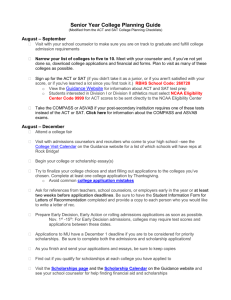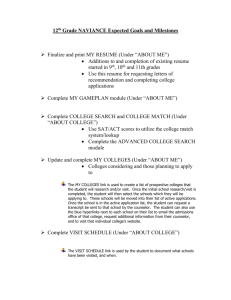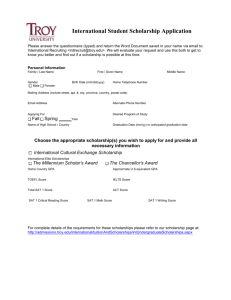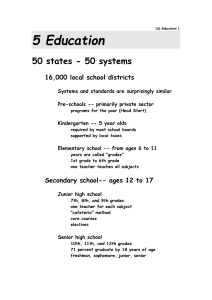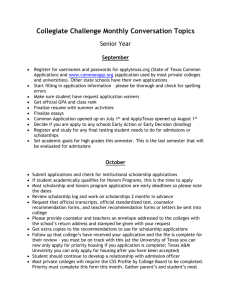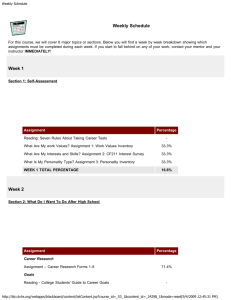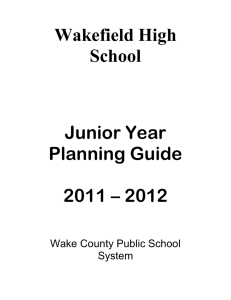Collegiate Challenge Monthly Conversation Topics
advertisement
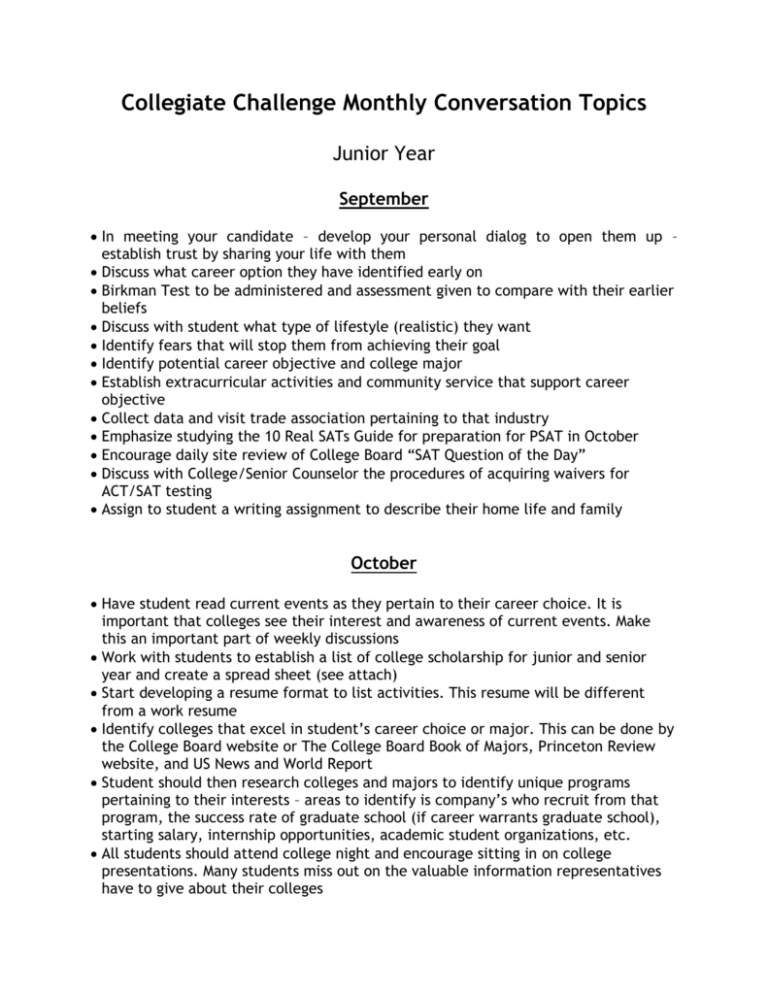
Collegiate Challenge Monthly Conversation Topics Junior Year September In meeting your candidate – develop your personal dialog to open them up – establish trust by sharing your life with them Discuss what career option they have identified early on Birkman Test to be administered and assessment given to compare with their earlier beliefs Discuss with student what type of lifestyle (realistic) they want Identify fears that will stop them from achieving their goal Identify potential career objective and college major Establish extracurricular activities and community service that support career objective Collect data and visit trade association pertaining to that industry Emphasize studying the 10 Real SATs Guide for preparation for PSAT in October Encourage daily site review of College Board “SAT Question of the Day” Discuss with College/Senior Counselor the procedures of acquiring waivers for ACT/SAT testing Assign to student a writing assignment to describe their home life and family October Have student read current events as they pertain to their career choice. It is important that colleges see their interest and awareness of current events. Make this an important part of weekly discussions Work with students to establish a list of college scholarship for junior and senior year and create a spread sheet (see attach) Start developing a resume format to list activities. This resume will be different from a work resume Identify colleges that excel in student’s career choice or major. This can be done by the College Board website or The College Board Book of Majors, Princeton Review website, and US News and World Report Student should then research colleges and majors to identify unique programs pertaining to their interests – areas to identify is company’s who recruit from that program, the success rate of graduate school (if career warrants graduate school), starting salary, internship opportunities, academic student organizations, etc. All students should attend college night and encourage sitting in on college presentations. Many students miss out on the valuable information representatives have to give about their colleges Spend some time going over the college brochures and material with students. More times than not, they are never revisited Register to take the November, December, and/or January SATs (studies indicate that these are easier test dates using old test material). In registration, indicate a copy of the test questions and answer sheet to be sent with test results – this can be used as a future study guide Register and study for the December or February ACT test. All students should take both to identify which test is more suited for them Discuss study time commitment and set goals for test scores – make them accountable November Continue encouraging studying for both the ACT and SATs Continue more career research to expand to the Department of Labor Occupational Handbook online Encourage to read trade magazine that can be found on career specific association’s website. i.e. – Society of Automotive Engineers has a trade magazine with industry news Develop leadership roles in clubs and activities – consider a food drive and clothing drive for homeless shelters during the holidays or help distribute blankets to homeless. This allows development of a strong essay with the experience of giving Work on college scholarships in finding out what is needed to be awarded a scholarship from colleges and organization (ex: GPA requirement, extracurricular activities, leadership skills, required course that need to be taken) December Encourage community service over holiday break Read/watch news – current events Get on mailing list to colleges of interest Study for SATs and ACTs Discuss a reading list option to improve reading skills and vocabulary words – Reader’s Digest, Time Magazine, USA Today – all which are found in most libraries Read at least one career centered book January Start brainstorming about potential college essay topic Identify what is the student’s strengths to emphasize on the application – find a pattern Assign writing exercises for the student. Most English classes require essay writing, ask to review assignment to give them pointers on expression Go over sample essays with student to gain perspective Start completing the chart of college requirements January continued: Start to make email contact with college representatives to interested schools Ask colleges about financial assistance to arrange for college visits for Spring Break Identify any testing deficiency of the student – i.e. TAKS, SATs, ACT – suggest additional tutoring or a study commitment Review SATs/ACT test results, test questions, and answer sheet Attend college financial aid and scholarship session February Go over college requirement list and identify were scores stand in comparison Decide to retake any standardized test – encourage SAT I and ACT testing be completed by April Decide if SAT II Subject Test is needed for admission and plan on taking those in May or June Continue communicating with colleges and follow up on research on careers – students should now be more familiar with what that career does Identify summer programs that allows for internships, shadowing, or volunteering in that area – programs in business and be done by Junior Achievements, Future Business Leaders of America, and local universities Start identifying organizations students can join that offer scholarships, ie. LULAC, Urban League, Mayor’s Youth Council, NAACP, Boy Scouts, and Girls Scouts Identify career specific scholarships Cross reference college list with College Money Guide to identify good financial aid school – start narrowing down Look at current year’s application and identify which area of the student’s profile that need to be worked on Discuss essay topics of current year’s application and brainstorm how they would answer the questions March On scholarship websites, view essays and profile of past winners – discuss with students the competitiveness of scholarships Discuss current events issues and look for article that they can read on topics you think are important Finalize summer plans – working, summer school, enrichment program, community service, and reading assignments Finalize college visit plans for Spring Break Encourage running for school leadership position – club, student government, prom committee, etc Study for SAT IIs and set goals for test scores – they can study for subject exams while studying for AP exams April Review career and industry they want to work in – make sure they know the difference; career is what they do and the industry is who they do it for (lawyer for the retail industry) Once they discover career – talk about industry and have student research that industry; they need to identify who are potential employers for motivation Identify what type of lifestyle they want Go on (website) that identify a real budget (cost of living); they have to realize how much one needs to live comfortably Have them start collecting pictures from magazines to create a visual board – this will be a fun break for the end of the year May Review scholarship list and identify with student which scholarships should be done over the summer Make visual board as an exercise – mentor should make one too At the end of the semester dinner, they can share their goals if they are comfortable – use this to kick off a productive summer and goal setting for senior year

